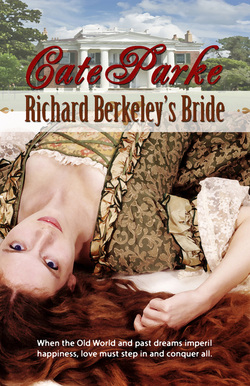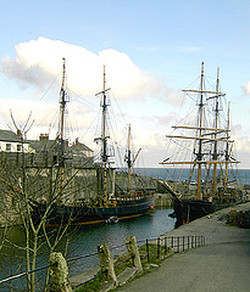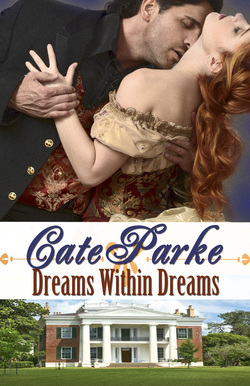
Not so very long ago, less than three hundred years ago to be a bit imprecise, the arranged marriage was de rigueur for society’s brides. Prospective brides and grooms expected to be pawns in their families’ play for wealth and position. Grooms may actually have seen their prospective brides a time or two before the wedding, may have danced with her a time or two, and may even have spoken to them without benefit of a hovering female relative nearby. Lucky man!
What must the prospective bride have felt, however, to be removed bodily from everything she knew—everything and everyone she’d held dear and taken to a new place, to live among people about whom she knew nothing? Forced to adapt to a new language, perhaps, and possibly strange customs, she must have felt like the proverbial fish out of water.
In Richard Berkeley’s Bride, a similar circumstance confronted Alexandra Campbell. Not long before her ninth birthday, her father abandoned her and left to fight a war. He sent her to England to foster with his brother, the presumptive Duke of Argyll. Her English family had been strangers to her when she arrived from colonial South Carolina, and Alexandra had been hopeless that they would love her any more than her forbidding father had who’d abandoned her to march north and fight in the French and Indian Wars. Far from the only home she’d ever known, she was hopeless that anyone would ever love her.
What must the prospective bride have felt, however, to be removed bodily from everything she knew—everything and everyone she’d held dear and taken to a new place, to live among people about whom she knew nothing? Forced to adapt to a new language, perhaps, and possibly strange customs, she must have felt like the proverbial fish out of water.
In Richard Berkeley’s Bride, a similar circumstance confronted Alexandra Campbell. Not long before her ninth birthday, her father abandoned her and left to fight a war. He sent her to England to foster with his brother, the presumptive Duke of Argyll. Her English family had been strangers to her when she arrived from colonial South Carolina, and Alexandra had been hopeless that they would love her any more than her forbidding father had who’d abandoned her to march north and fight in the French and Indian Wars. Far from the only home she’d ever known, she was hopeless that anyone would ever love her.

Instead, her English family loved her on first sight. Fast-forward ten years. Alexandra spent her years in England learning everything she could manage in hopes she might one day become the son he'd never had for the father she’d adored, hoping against all odds he might one day come to love her. During the years she’d spent in England, she’d become educated beyond that which any woman of her generation could expect to receive, she’d become a poised beauty, rivaling her mother, grandmother, and even her great-grandmother—all heralded as the most beautiful women in England. The queen called her to serve as a Maid of Honor in her court. A year later, she expected her grandfather to receive an offer for her hand from no less than a belted earl. It was only her just due as the granddaughter of two dukes and the great-granddaughter of three. Instead, her father’s terse message smashed her exciting expectations. She would return to Charlestowne to marry the son of a friend of his.

She’d spent every single day of her long voyage home to South Carolina, dreading to learn who her father had chosen for her—he’d overlooked that bit of vital information. Typical of his careless treatment of her. Where did her unknown betrothed live and who were his people? Was he a middle-aged widower with a large family of children she’d be expected to rear? Was he an educated Charlestonian gentleman of good family, or did he live beyond the western mountains on the distant frontier? She was aware that such men existed—those who might clean up well for society’s sake, but lived brutally hard lives expecting their wives to labor at their sides. Would her father’s chosen husband value her learning and encourage her scholarship or would he force her to live a hard life among people about whom she knew and cared nothing? She was Alexandra Campbell, for Heaven’s sake! She had danced in palaces among princes. How could her father place her in such difficult straits?

Her father’s ship docked in Charlestowne and her first surprise greeted her—her father greeted her as his prodigal daughter, returned at long last. Her second surprise came only a moment or so later when she looked into the eyes of the handsomest man she’d ever beheld. And she knew him! She’d even fallen in love with him during the only dance they’d been permitted at the ball her grandfather gave to introduce her to society. Nothing changed one single small fact--the fact that mattered most of all. Richard Berkeley was an utter stranger.

As an even greater trial, so was her father. To add to her challenging position, her father announced their marriage would take place in twelve days’ time. The betrothal documents would be signed the following evening and the final banns would be called the day after that. The only beacon on Alexandra’s distant horizon was the discovery that Oakhurst, the home of her birth, would become part of her magnificent dowry. All she had to do was learn to love, cherish, and...understand the man with whom she would share it all. It should be easy. Shouldn’t it?